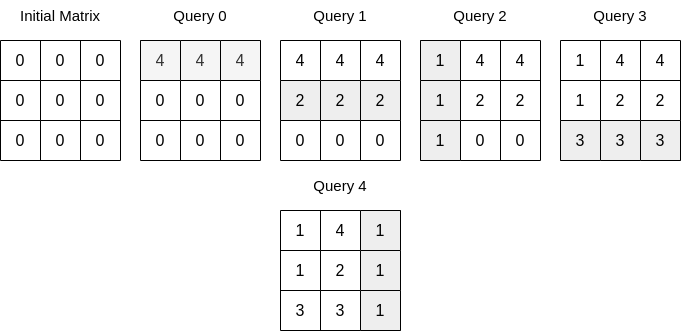Problem
You are given an integer n and a 0-indexed 2D array queries where queries[i] = [typei, indexi, vali].
Initially, there is a 0-indexed n x n matrix filled with 0's. For each query, you must apply one of the following changes:
- if
typei == 0, set the values in the row withindexitovali, overwriting any previous values. - if
typei == 1, set the values in the column withindexitovali, overwriting any previous values.
Return the sum of integers in the matrix after all queries are applied.
Example 1:

Input: n = 3, queries = [[0,0,1],[1,2,2],[0,2,3],[1,0,4]]
Output: 23
Explanation: The image above describes the matrix after each query. The sum of the matrix after all queries are applied is 23.
Example 2:

Input: n = 3, queries = [[0,0,4],[0,1,2],[1,0,1],[0,2,3],[1,2,1]]
Output: 17
Explanation: The image above describes the matrix after each query. The sum of the matrix after all queries are applied is 17.
Constraints:
1 <= n <= 1041 <= queries.length <= 5 * 104queries[i].length == 30 <= typei <= 10 <= indexi < n0 <= vali <= 105
Solution (Java)
class Solution {
public long matrixSumQueries(int n, int[][] queries) {
var rows = new boolean[n];
var cols = new boolean[n];
int rowCnt = n, colCnt = n;
var sum = 0L;
for (var i = queries.length - 1; i >=0 && rowCnt > 0 && colCnt > 0; i--) {
if (queries[i][0] == 0) {
if (rows[queries[i][1]]) continue;
rows[queries[i][1]] = true;
rowCnt--;
sum += colCnt * queries[i][2];
} else {
if (cols[queries[i][1]]) continue;
cols[queries[i][1]] = true;
colCnt--;
sum += rowCnt * queries[i][2];
}
}
return sum;
}
}
Explain:
nope.
Complexity:
- Time complexity : O(n).
- Space complexity : O(n).